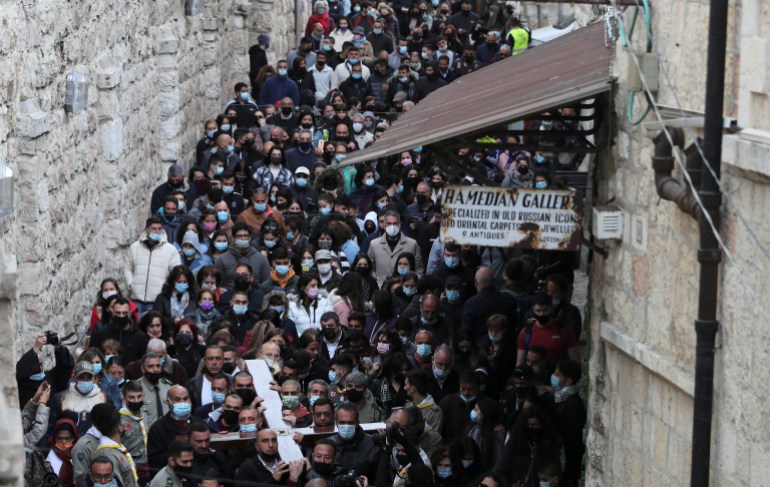Christians mark Good Friday amid lingering COVID-19 woes
Worshippers mark a second annual Holy Week under various movement restrictions amid outbreaks fanned by new variants.

Christians in the Holy Land are marking Good Friday with religious sites open to limited numbers of faithful but none of the mass pilgrimages usually seen in the week leading up to Easter.
The virus is still raging in the Philippines, France, Brazil and other predominantly Christian countries, where worshippers are marking a second annual Holy Week under various movement restrictions amid outbreaks fanned by more contagious strains.
Keep reading
list of 3 itemsEpiphany: Thousands of Orthodox Christians ignore COVID warnings
Pope Francis urges Iraq’s Muslims, Christians to unite for peace
Last year, Jerusalem was under a strict lockdown, with sacred rites observed by small groups of priests, often behind closed doors.
It was a stark departure from previous years when tens of thousands of pilgrims would descend on the city’s holy sites.
This year, Franciscan friars in brown robes led hundreds of worshippers down the Via Dolorosa while reciting prayers through loudspeakers at the Stations of the Cross.
Another group carried a wooden cross along the route through the Old City, singing hymns and pausing to offer prayers.
The Church of the Holy Sepulchre is open to visitors with masks and social distancing.

“Things are open, but cautiously and gradually,” said Wadie Abunassar, an adviser to church leaders in the Holy Land. “In regular years we urge people to come out. Last year we told people to stay at home … This year we are somehow silent.”
Israel has launched one of the world’s most successful vaccination campaigns, allowing it to reopen restaurants, hotels and religious sites. By the end of March, more than half of Israel’s 9.2 million population had received both doses of the Pfizer-BioNTech vaccine against COVID-19.
However, air travel to Israel is still limited by quarantine and other restrictions, keeping away the foreign pilgrims who usually throng Jerusalem during Holy Week.
The main holy sites are in the Old City in East Jerusalem, which Israel occupied along with the West Bank in the 1967 war.
Israel annexed East Jerusalem and considers the entire city its unified capital.

Israeli authorities said up to 5,000 Christian Palestinians from the occupied West Bank would be permitted to enter for Easter celebrations.
Italy
In Italy, Pope Francis began Good Friday with a visit to the Vatican’s COVID-19 vaccination centre, where volunteers have spent the past week administering some 1,200 doses to poor and disadvantaged people in Rome.
The Vatican City State bought its doses to vaccinate Holy See employees and their families, and has been giving away surplus supplies to homeless people. A masked Francis posed for photos with some of the volunteers and recipients in the Vatican audience hall.

France
In France, a nationwide 7pm curfew is forcing parishes to move Good Friday ceremonies forward in the day, as the traditional Catholic night processions are being drastically scaled back or cancelled. Nineteen departments in France are on localised lockdowns, where parishioners can attend daytime mass if they sign the government’s “travel certificate”.
Although a third “light” lockdown is being imposed on Saturday, President Emmanuel Macron has wavered on a travel ban for Easter weekend, allowing the French to drive between regions to meet up with family on Friday.

Spain
In Spain, there will be no traditional processions for a second year in a row, and churches will limit the number of worshippers.
Many parishes are going online with mass and prayers via video streaming services.
Philippines
In the Philippines, streets were eerily quiet and religious gatherings were prohibited in the capital, Manila, and four outlying provinces.
The government placed the bustling region of more than 25 million people back under lockdown this week as it scrambled to contain an alarming surge in COVID-19 cases.
